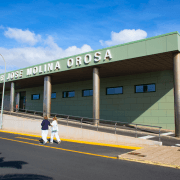Yesterday, Lanzarote reported 29 new cases of coronavirus – the highest number since the crisis started. Currently, there are 86 active cases on Lanzarote. However, not one of these cases is in hospital, and all are reported as being “asymptomatic or suffering mild symptoms. So why does the virus appear to be less deadly?
Younger cases
The virus appears to be the same, with no indications that it has mutated into a less lethal form, so presumably it’s still as dangerous to vulnerable groups as it ever was. But this time around those vulnerable groups aren’t the ones testing positive.
In the Canaries, the largest-growing group of new cases is those between 20-29 years old, followed by those in their 30s and then those in their 40s. Meanwhile, cases among older Canarians are still in decline. That doesn’t mean they’ve gone away – 51 Canarians remain in hospital with the virus, four in intensive care – but the new outbreaks have mainly been sourced to parties, family reunions and workplaces, with fewer clusters in hospitals and care homes.
Why young people are generally less susceptible to the serious symptoms of the virus is still unknown, but it explains why all the positive cases on Lanzarote are hopefully sitting at home on their own watching TV or playing videogames.
Voluntary shielding
Vulnerable groups are also those who are more likely to take the measures likely to avoid exposure in the first place. Even before mask use became compulsory in all public spaces last week, it was more visible in older citizens than younger ones, and it’s still normal to hear locals speak about older relatives who rarely or never leave their homes.
UK-style “shielding” was never proposed in Spain, where social ties between the generations are so much stronger, but it does appear to have been taking place to a certain extent regardless.
Successful tracing and testing
In the last week, the Canaries has carried out roughly 2,000 PCR tests a day, a significant increase on previous weeks. Tests are not conducted randomly. They are mainly performed on those who are suffering the classic symptoms of the virus, close contacts of positive cases and those undergoing surgery. As a result, cases are being detected that would have previously not have been registered because they were asymptomatic or mild.
Better health care
Healthcare staff and tracing teams are now dealing with new cases with six months of hard-won experience behind them. Lack of pressure on hospitals and intensive care units means that health workers can devote more time and care to those who are admitted. This may not be as strong a factor on the Canaries, but it certainly applies in areas such as Madrid, where the health system almost collapsed in March and April.










